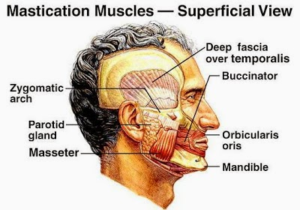TMJ

The Temporomandibular Joint (TMJ) is a very important joint of the body. In order for it to work properly it must use a tremendous amount of nerves, more than any other joints, in order for you to chew food and talk. If you take a moment and follow my words you may be amazed about this joint that you never considered much.
This joint has a disc and the only joints in our body that have a disc are the vertebra, your collarbone, sternum, and your pubic bone. Joints that have discs are considered more complex in their design and function. Discs are made of cartilage which allows more shock absorption, complex motion, and stability.
The TMJ is supplied with 4 major muscles on each side; 3 that close and one that opens your mouth. The temporalis, internal pterygoid and masseter. Your masseter muscle is the most powerful muscle per square inch and if allowed to contract fully, it would break your jaw bone (mandible). What stops that from happening is the teeth and TMJ joint have pressure and location sensors that tell the brain that the bite is good and the brain then can stop the nerve impulses into the muscle (relaxes). That ability to make your bite hit perfectly with the right pressure requires a lot of brain and nerve function. That is why it requires more nerves than any other joint.
Boring so far, huh? Did you know that if is you were in the desert and your TMJ is not perfectly functioning you would wander around in a circle. Did you know that if the TMJ is not set right you can lose range of motion in your shoulder. In fact if you have a joint that is stiff, tight or does not have the motion as before, it could be your TMJ. How would you know? Try moving the joint that you have a problem with. Then do it again with your teeth clenched; then with your mouth opened wide. If you noticed a change to your motion the TMJ may be off. If you noticed nothing, then that is good, because you ruled out a cause to your problem. If this problem has been 3 months to a year, you need to get help. Of course is would be best to talk to you primary physician/family doctor first, which I highly recommend, but many times they lack clinical understanding of a joint problem that is not fractured, dislocated or degenerated enough to show destruction of a joint. However, you really need to find and consult with someone like a massage therapist, chiropractor, acupuncturist or take classes in Tai Chi, Chi Gong, Yoga or Palates, to see if that helps. It’s so important to take care of your joints when you notice pain or stiffness.
People will usually know if they have a TMJ syndrome. Their jaw is painful and stiff and may crack or click on opening and closing, eating isn’t pleasant at this point. You know that eating without any symptoms was a blessing. The turmoil of chewing makes you not want to eat. It is a terrible condition. If you have not done so already, going to a dentist is a great first step. There are few dentists that can treat TMJ syndrome. They will usually know a dentist to refer you to. Remember, going to a doctor does not mean that they throw you in a room and start work. You should seek a consult with any doctor. Listen to their advice and take time to make your decisions.
So, if you have done what I told you and you still suffer there is always a chance to heal. I have seen TMJ syndrome get better with eliminating certain foods (wheat usually), fixing a foot subluxation, fixing an upper cervical subluxations, low stomach acid, anemia, and vitamin deficiencies. So never give up. Don’t forget massage, chiropractic, acupuncture, cranial work (SOT and Cranial Sacral), and the classes I have mentioned. If you want more help call my office and we will be happy to talk with you.
Did you ever figure out why you would walk in a circle in the desert?
Yours in Health,
Dr. Michael McCall




